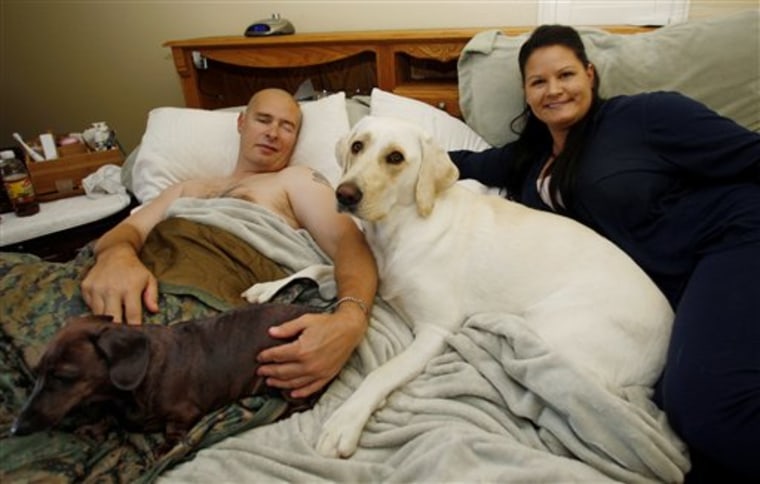Maria Del Carmen Del Toro couldn't access her husband Israel's bank account for more than four months while he lay comatose after a roadside bomb attack in Afghanistan.
With no income, she and her son Israel Jr. relied on the Air Force and friends for a place to stay and money for basic necessities. Meanwhile, the car loan, credit cards and other bills went unpaid. Penalties piled up, and the tab totaled nearly $20,000 when the severely burned technical sergeant awoke.
Defense Department statistics show more than 17,000 service members have been severely wounded in the Iraq and Afghanistan wars. These troops often face years of complex medical care and extensive therapies. And their finances often become casualties along the way.
Advances in medical care have helped thousands survive injuries that previously would have been fatal. That reality has led to new military programs to help the wounded and their families work through issues that were rare in past conflicts.
Service members now automatically get a life insurance policy, for instance, that includes a traumatic injury provision that will pay up to $100,000 if they receive a disabling injury.
The four branches of the military have also created units to offer assistance throughout the treatment and recovery process.
Among the services offered by the Army Wounded Warrior program, for instance, are advocates who help families access military and Department of Veterans Affairs benefits, and help from nonprofit organizations.
There are currently about 160 advocates working with roughly 6,000 families. The advocates can direct wounded service members to entitlements they qualify for. Among the possibilities are emergency financial help, child care assistance, career counseling and tuition for career education, and even VA grants of up to $50,000 for renovations to adapt homes to accommodate wheelchairs or other needs.
But there are often caveats. Del Toro, injured in December 2005, was eligible for the home renovation grant after he was able to leave the hospital. But the grant requirements didn't address the changes he needed in his Cibolo, Texas, house. Although he was using a wheelchair early in his recovery, for instance, he knew he would walk again and didn't want to build a ramp or widen doorways. Instead he needed to adapt the house to accommodate the loss of his fingers, something that didn't fit neatly into the grant requirements.
"They wanted me to use the money the way they wanted it," he said. "They weren't considering that I was a severely burned guy."
Some of his friends ended up raising $20,000 to do the necessary work, and help replace the sports car he could no longer handle.
After several years of lobbying, families will also soon be able to get paid for the help they provide. A law will take effect in January that allows family members like Christine Schei to earn a salary for working as caregivers, at rates similar to what home care workers would earn.
Christine took on round-the-clock care for her son, Sgt. Erik Schei, after a sniper's bullet pierced his helmet in Mosul, Iraq, in 2005. She gave up her $32,000-a-year job as an office manager. His father, Gordon, also gave up a salaried position for a job with hourly wages closer to the family's Rio Rancho, N.M., home, so he could be more available to help. Together, their income has dropped to about a third what they used to bring in.
The reforms will also help pay for caregivers' own medical care, and provide respite care for temporary relief. "This is going to make a big difference," Schei said.
The next fight: trying to get the VA to modernize a system that requires detailed reports on a wounded veteran's finances, but has no associated software.
"They literally give you a form to fill out," Schei said. While she understands that the accounting is mandated to make sure no one misuses a veteran's benefits, she said the system seems like it hasn't been updated since it was created in the 1940s. "It's tedious, and it's time consuming."
The situation is a lot better for service members and their families than it was back in 2004, said Joyce Raezer, executive director of the National Military Family Association, an advocacy group. "But there are remaining challenges. There's a potential for people to fall through the cracks and not be able to access the resources and benefits they need."
That means getting assistance requires constant effort.
"You need to be informed and active," said Tonia Sargent, whose husband, Kenneth, was shot below his right eye after an ambush near Najaf, Iraq, in 2004, and retired from the Marine Corps last year.
"I can't tell you how much paperwork I've swam in," Sargent said. "People wonder if I'm a hoarder."
Families say they often provide the same information multiple times, and skipping a single form can mean missing out on important benefits — like one that provides extra pay after retirement if an injury was the result of combat.
Sargent has spent six years learning how the system works, what benefits are available and how to access them. A former aerobics instructor who gave up her job to care for her husband, she's an advocate who has very publicly tried to push the military and VA to answer the needs of families.
She also tries to share what she's learned with others. One family she's helping believed they faced homelessness, because the injured Marine is about to retire and they thought they had to leave their base housing.
"His wife was looking for shelters," she said. No one told them they could try to delay his separation from the service, or even if he does retire, they could pay rent on base until they find a place to live. "That buys them time."
